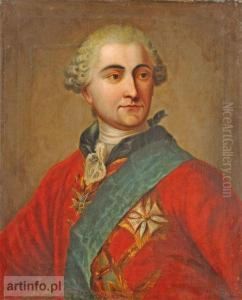Stanislaw August Poniatowski Paintings
Stanisław August Poniatowski was not an artist, but rather a notable figure in Polish history, serving as the last King and Grand Duke of the Polish-Lithuanian Commonwealth from 1764 to 1795. Born on January 17, 1732, in Wołczyn, then part of the Polish-Lithuanian Commonwealth (now in Belarus), he was a member of the Poniatowski family and the Czartoryski family through his mother. Poniatowski was the second son of Stanisław Poniatowski, the castellan of Kraków, and Princess Konstancja Czartoryska.
Poniatowski's early years were marked by extensive education and travel in Western Europe, which influenced his liberal and reformist ideas. He had an affair with Catherine the Great of Russia, which elevated his political standing. With her support, along with that of the influential Czartoryski family, he was elected King of Poland on September 7, 1764.
His reign was a period of reforms aimed at strengthening the Commonwealth and modernizing its institutions. The most significant achievement of his rule was the Constitution of May 3, 1791, which sought to limit the nobility's power, strengthen the monarchy, and protect the peasantry. It was the first modern constitution in Europe and the second in the world after the United States Constitution.
However, Poniatowski's efforts to reform the Commonwealth faced severe challenges from both internal opposition and neighboring powers, particularly Russia, Prussia, and Austria, which were opposed to a strong, independent Poland. These powers intervened and the subsequent partitions of Poland, which occurred in 1772, 1793, and 1795, ultimately led to the country's dissolution.
Poniatowski was forced to abdicate on November 25, 1795, and he spent the last years of his life in Saint Petersburg, Russia, under the patronage of Catherine the Great. He died on February 12, 1798, and was buried in St. Petersburg. Though his political career was fraught with turmoil, Stanisław August Poniatowski is remembered as a patron of the arts and sciences, a proponent of enlightenment thought, and an important figure in the history of Poland's struggle for sovereignty.
